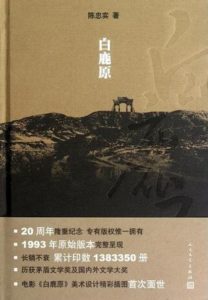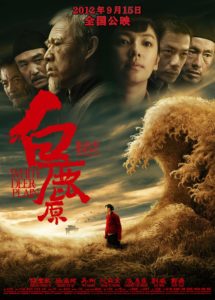White Deer Plain
白鹿原
China, 2012, colour, 2.35:1, 165 mins. (premiere version)/149 mins. (release version).
Director: Wang Quan’an 王全安.
Rating: 6/10.
Potentially epic peasant drama, with a fine cast, is undercut by an uninvolving approach.
White Deer village, White Deer plain, southeast of Xi’an, Shaanxi province, central China. In 1911, news reaches White Deer village that the Imperial Qing dynasty has been overthrown and China is now a republic. The following year, the villagers revolt against a grain tax by the new revolutionary government and in the clash several are arrested. Meanwhile, Bai Xiaowen (Yang Chen Jiayu), young son of dominant clan leader Bai Jiaxuan (Zhang Fengyi), and Lu Heiwa (Yang Junjie), young son of Lu San (Liu Wei), Bai’s loyal servant, become sworn blood brothers. A decade later, the marriage ceremonies of Bai Xiaowen (Cheng Taisheng) and Lu Zhaopeng (Guo Tao), from the Lu family, are due to be take place together, but Lu Zhaopeng rebels and leaves the village. In the Guanzhong plain, Tian Xiao’e (Zhang Yuqi), a concubine of local bigwig Master Guo (Xu Huanshan), sets her eye on Lu Heiwa, who is working as a wheat harvester but planning on leaving the area to seek a better life. The two eventually start a passionate affaire until they are discovered one night in a haystack, publicly tortured, and dumped in a wheatfield. Lu Heiwa and Tian Xiao’e ask permission of Bai Jiaxuan, keeper of the ancestral temple, to marry and have their names entered in the clan records; but the conservative Bai Jiaxuan refuses to rush into anything, partly because Tian Xiao’e is an “outsider”, from Zishui county. As Lu Heiwa’s sworn brother, Bai Xiaowen secretly helps the couple by letting them stay in an abandoned cave home, away in the hills. Meanwhile, Lu Zhaopeng, who has joined the Communist Party, returns and starts the first primary school in White Deer plain, and also tries to politically educate Lu Heiwa. When a Nationalist platoon leader, Yang (Cao Xi’an) arrives and commandeers the village’s wheat supplies, violence breaks out as his troops go on the rampage and the locals burn the wheat rather than let it be stolen. In 1926, Lu Zhaopeng helps to set up the Peasants Union, and Lu Heiwa, its head, leads an assault on White Deer village’s ancestral temple, wrecking it. Violence and show trials follow as the Communists take charge, but the wheel later turns as Tian Xiao’e’s father, Tian Fuxian (Zhang Dehang), leads an anti-Communist movement. Both Lu Zhaopeng and Lu Heiwa flee the area. And with Lu Heiwa away and seemingly never to return, Tian Xiao’e turns her attentions to Bai Xiaowen, who has been made clan leader by his aged father Bai Jiaxuan. But he is not the only man in her life, leading to further strife in the village as conditions worsen over the years.
REVIEW
White Deer Plain 白鹿原 is a “big” film by a talented but essentially “small” filmmaker. Despite impeccable casting, some powerful individual scenes, and a flavoursome sense of place and time, it signally lacks a strong enough dramatic arc to sustain its multi-generational story and almost three hours’ running time. With a promising start, a rather inert middle section and an underwhelming finale, the viewer has no sense of being taken on an epic journey and remains emotionally unengaged throughout. In his previous five movies, writer-director Wang Quan’an 王全安 has shown a gift for detailing small emotions within large landscapes (The Story of Ermei 惊蛰, 2004; Tuya’s Marriage 图雅的婚事, 2006) or within big themes (Apart Together 团员, 2010). But the sheer scope of Plain demanded more than emotional minutiae in order to work on the big screen: it needed a film-maker with a command of larger structures and the ability to make the drama resonate.
 The one and only full-length work by Shaanxi writer Chen Zhongshi 陈忠实 [who died in 2016, aged 73], the original 1993 novel followed developments in two families in White Deer village across half a century of political upheaval – from the fall of imperial China in 1911, through the Nationalist warlord period, to the Japanese invasion, and to civil war between the Communists and Nationalists in the late 1940s. The product of five years’ local research and writing by Chen, it was begun in 1987 and published in 1993, and has since achieved the status of a “national epic”, with Shaanxi province and the CPC at its centre (see cover of 20th anniversary edition, left). With a complex, multi-character plot that also spans a politically sensitive era, it was long deemed an unfilmable novel, and several directors, including Zhang Yimou 张艺谋, were mooted at some point. [The novel has been adapted into many other forms, including a manga (2002), play (2006), ballet (2011) and 77-part TV drama series (2017).]
The one and only full-length work by Shaanxi writer Chen Zhongshi 陈忠实 [who died in 2016, aged 73], the original 1993 novel followed developments in two families in White Deer village across half a century of political upheaval – from the fall of imperial China in 1911, through the Nationalist warlord period, to the Japanese invasion, and to civil war between the Communists and Nationalists in the late 1940s. The product of five years’ local research and writing by Chen, it was begun in 1987 and published in 1993, and has since achieved the status of a “national epic”, with Shaanxi province and the CPC at its centre (see cover of 20th anniversary edition, left). With a complex, multi-character plot that also spans a politically sensitive era, it was long deemed an unfilmable novel, and several directors, including Zhang Yimou 张艺谋, were mooted at some point. [The novel has been adapted into many other forms, including a manga (2002), play (2006), ballet (2011) and 77-part TV drama series (2017).]
Of necessity, Wang’s script massively simplifies the 500-plus page novel, but it also ends short (in 1938 as a Japanese plane attacks the village), omitting the post-WW2 civil war and creating a different ending. By then, however, the political background to the narrative, which remains strong during the movie’s first half, has almost disappeared, as well as at least one interesting character – rebellious son-turned-Communist Lu Zhaopeng, well played by Guo Tao 郭涛, an actor more often seen in comic roles. In its place, the last hour of the film is dominated by the character of outsider Tian Xiao’e and her sexual shenanigans, which completely throw off the balance of the movie.
As his first four films with actress (and onetime partner) Yu Nan 余男 proved, Wang, 46, is an especially good director of women; and the lynx-eyed Zhang Yuqi 张雨绮 (CJ7 长江7号, 2008; The Butcher, the Chef and the Swordsman 刀见笑, 2010), now his wife [later divorced, in 2015], is very good as the convention-busting Tian Xiao’e. But structurally, the focus on her character – the only major female role in the movie – to the detriment of other roles and of outside political events takes the film down a cul-de-sac from which it never really emerges.
Other actors are equally well cast and played, with Zhang Fengyi 张丰毅 bringing his commanding physical presence to the role of the Bai clan leader, who remains firm to his traditional Confucian principles amid major changes. Also registering strongly are Duan Yihong 段奕宏, as Lu Heiwa, the political hothead son of the Lu family, and Wu Gang 吴刚 as a duplicitous village mayor. As Bai Xiaowen, the son of the Bai family who also becomes involved with Tian Xiao’e during her husband Lu Heiwa’s absence, Cheng Taishen 成泰燊 is okay but not so strongly drawn.
German d.p. Lutz Reitemeier, who’s shot all of Wang’s films apart from his debut feature Lunar Eclipse 月蚀 (1999), delivers typically cool colours for the changeable Shaanxi landscape (for scenes of winter, drought and abundant cornfields) and moody, dark interiors for the homes and houses. And production design by the excellent Huo Tingxiao 霍廷霄 (Hero 英雄, 2002; Wheat 麦田, 2009; Aftershock 唐山大地震, 2010) and costumes by Ma Defan 马德帆 (Red Firecracker, Green Firecracker 炮打双灯, 1994; Under the Hawthorn Tree 山楂树之恋, 2010) have an impressively real look and feel. Both reflect the movie’s often salty dialogue – largely in Shaanxi dialect, with some standard Mandarin – and its frank, though visually non-explicit, approach to sex. The latter was a notable feature of the original novel, though the movie has nothing that hasn’t appeared in several other peasant sagas.
Though noted Mainland composer Zhao Jiping 赵季平 (who scored the early movies of Zhang Yimou, Chen Kaige 陈凯歌 and He Ping 何平, among many) is credited with providing the music, the film essentially has none, apart from occasional local songs – a major pity, as a good score would have helped enormously to create some emotional engagement and give the film some shape. The film’s bumpy structure shows signs of tinkering during its lengthy post-production, both by Wang (credited as editor) and by requests for changes by SARFT. As of late last year [2011], the film was reportedly around 210 minutes long; billed for its Berlinale world premiere as 188 minutes, it actually screened in a 165-minute version. As it stands at present, the film would actually work better in a radically shorter cut of around two hours, or a much longer one of well over three. [The film was subsequently cut by a further 16 minutes, to 149, for Mainland release, and that version put out on DVD. The version reviewed here is the 165-minute Berlinale premiere one.]
The Chinese title literally means “White Deer Plain” but plays on the names of the two main families (Bai 白, literally “white”, and Lu 鹿, literally “deer”). It’s another weakness of the script that the divisions between the families don’t come over a strong dramatic driver. On a technical level, and in the performances, White Deer Plain is never less than a professional piece of film-making; but its parts just don’t add up to an involving or suitably epic adaptation of the original material.
CREDITS
Presented by Shaanxi Bai Lu Yuan Film (CN), Lightshades Film Productions (CN), Xi’an Movie & TV Production (CN), Western Film Group (CN). Produced by Bai Lu Yuan Film (CN).
Script: Wang Quan’an. Novel: Chen Zhongshi. Photography: Lutz Reitemeier. Editing: Wang Quan’an. Music: Zhao Jiping. Production design: Huo Tingxiao. Costume design: Ma Defan. Sound: Yang Xin, Lou Yatou, Wang Changrui. Special effects: Wang Bingliang.
Cast: Zhang Fengyi (Bai Jiaxuan), Zhang Yuqi (Tian Xiao’e), Wu Gang (Lu Zilin, town mayor), Liu Wei (Lu San), Duan Yihong (Lu Heiwa, Lu San’s son), Cheng Taishen (Bai Xiaowen, son of Bai Jiaxuan), Guo Tao (Lu Zhaopeng), Xu Huanshan (Master Guo), Zhang Dehang (Tian Fuxian), Cao Xi’an (Yang, platoon leader), Yang Junjie (young Lu Heiwa), Yang Chen Jiayu (young Bai Xiaowen), Yang Zexin (young Lu Zhaopeng).
Premiere: Berlin Film Festival (Competition), 15 Feb 2012.
Release: China, 15 Sep 2012.
(Review originally published on Film Business Asia, 17 Feb 2012.)
